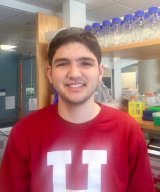Assessing Combinatory Effect of PARP Inhibitor with DNA Damaging Agent on Rhabdomyosarcoma at Single Cell Resolution

Background
Combination therapies using cytotoxic drugs have revolutionized the treatment of pediatric rhabdomyosarcoma (RMS). Despite these major steps forward, cure rates have largely remained stagnant since their implementation. This can be attributed to two main reasons: 1) the lack of a high-throughput screening and in vivo drug validation platforms to identify clinically relevant drugs and 2) insufficient understanding of how therapies target specific heterogeneous RMS cell populations. To address these issues, the Langenau laboratory has pioneered large-scale cell transplantation studies in zebrafish to identify novel therapies that work in vivo and identified functional cell heterogeneity in embryonal rhabdomyosarcoma. Findings in the zebrafish have important clinical and therapeutic relevance to human disease. Building on these successes, we have recently generated optically clear, immune deficient zebrafish that lack T, B and Natural Killer (NK) cells which can engraft a wide array of human cancers, including RMS. Preliminary studies in the lab have already uncovered potent additive effects of the PARP inhibitor, Olaparib, and the DNA damaging agent, Temozolomide, on inducing killing of human RMS in vivo. This same therapy has now been optimized for clinical treatment of other cancers, including phase 2 trials in Ewing sarcoma. Building on these findings, my hypothesis is that drug combinatorial therapy using established PARPi and DNA damaging agents will be an effective therapy for pediatric RMS. This work is important because it will define the best combinations to move forward clinically and will, for the first time, visualize mechanisms of drug killing directly in human RMS in vivo at a single cell resolution.
Project Goal
The project will aim to elucidate an optimal combination of wider array of PARPi and DNA damaging agents for human RMS cells using xenograft studies into immune-deficient zebrafish. Together, these approaches provide a rapid and novel approach to define new drug combinations that could rapidly move into the clinical setting for the treatment of RMS.
Mentored by Dr. David Langenau
Massachusetts General Hospital, Boston, MA

